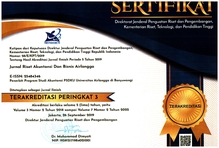THE EFFECT OF PUBLICITY OF THE PRESIDENT DIRECTOR AND MAJORITY SHAREHOLDERS ON TAX AVOIDANCE
Downloads
The study uses the volume search index (SVI) to see the publicity of the president director through Google Trends, and uses the percentage of share ownership to see stocks that aim to influence tax avoidance. The research object used is a public company registered at PT. Indonesia Stock Exchange and the 50 richest people listed on Forbes in the 2013-2018 period. The sample data of selected companies were 24 companies of 121 observation data for 6 years. This study uses multiple linear analysis. The results of the study support the first hypothesis which indicates that the main director who gets higher attention will do tax avoidance. Firms with higher publicity tend to use more tax planning services from auditors. While the research results contradict the second hypothesis that the higher the share owner will not do tax avoidance.In the end, it is hoped that the results of this research can be used to encourage the government to accelerate the Base Erosion and Profit Shifting mechanism which can be used as a reference for investors and company management to improve tax avoidance strategies so that in the future it will provide maximum benefits for the firm sustainability.
Downloads
Armstrong, CS, Blouin, JL, Jagolinzer, AD, & Larcker, DF (2015). Corporate governance, incentives, and tax avoidance. Journal of Accounting and Economics, 60 (1), 1-17.
Assidi, S., Aliani, K., & Omri, MA (2016). Tax optimization and the firm's value: Evidence from the Tunisian context. Borsa Istanbul Review, 16 (3), 177-184.
Badertscher, BA, Katz, SP, & Rego, SO (2013). The separation of ownership and control and corporate tax avoidance. Journal of Accounting and Economics, 56 (2-3), 228-250.
Brown, LD, & Caylor, ML (2006). Corporate governance and firm valuation. Journal of Accounting and Public Policy, 25 (4), 409-434.
Chen, S., Chen, X., Cheng, Q., & Shevlin, T. (2010). Are family firms more tax aggressive than non-family firms? Journal of Financial Economics, 95 (1), 41-61.
Christensen, J., & Murphy, R. (2004). The Social Irresponsibility of Corporate Tax Avoidance: Taking CSR to the bottom line. Development, 47 (3), 37-44. doi: 10.1057 / palgrave.development.1100066
Cialdini, RB, & Goldstein, NJ (2004). Social Influence: Compliance and Conformity. doi: 10.1146 / annurev.psych.55.090902.142015
Creswell, JW (2014). Research Design; Qualitative, Quantitative and Mixed Methods Approaches.
Desai, MA, & Dharmapala, D. (2006). Corporate tax avoidance and high-powered incentives. Journal of Financial Economics, 79 (1), 145-179.
Duan, T., Ding, R., Hou, W., & Zhang, JZ (2018). The burden of attention: CEO publicity and tax avoidance. Journal of Business Research, 87, 90-101.
Dyreng, SD, Hanlon, M., & Maydew, EL (2008). Long-Run Corporate Tax Avoidance. The Accounting Review, 83 (1), 61-82.
Dyreng, SD, Hanlon, M., & Maydew, EL (2010). The Effects of Executives on Corporate Tax Avoidance. The Accounting Review, 85 (4), 1163–1189.
Graham, JR (2008). TAXES AND CORPORATE FINANCE.
Hanlon, M., & Heitzman, S. (2010). A Review of Tax Research. Journal of Accounting and Economics, 50, 127-178. doi: 10.1016 / j.jacceco.2010.09.002
Hsieh, T.-S., Wang, Z., & Demurkan, S. (2018). Overconfidence and tax avoidance: The role of CEO and CFO interaction. Journal of Accounting and Public Policy, 37 (3), 241-253.
Jensen, MC, & Meckling, WH (1976). Theory of The Firm: Managerial Behavior, Agency Costs and Ownership Structure. Journal of Financial Economics, 3, 305-360
Jiménez-Angueira, CE (2018). The effect of the interplay between corporate governance and external monitoring regimes on firms' tax avoidance. Advances in Accounting, 41, 7-24.
K. Hung Chana, PLLM, Amy Y. Zhou. (2013). Government ownership, corporate governance and tax aggressiveness: evidence from China. Accounting & Finance, 53, 1029-1051.
Lanis, R., Richardson, G., Liu, C., & McClure, R. (2018). The Impact of Corporate Tax Avoidance on Board of Directors and CEO Reputation. Journal of Business Ethics.
Lim, Y. (2011). Tax avoidance, cost of debt and shareholder activism: Evidence from Korea. Journal of Banking & Finance, 35 (2), 456-470.
Maydew, EL (2001). Empirical tax research in accounting: A discussion. Journal of Accounting and Economics, 31 (2), 389-403.
Mulyadi, MS, & Anwar, Y. (2015). Corporate Governance, Earnings Management and Tax Management. Procedia - Social and Behavioral Sciences, 177, 363-366.
Olsen, KJ, & Stekelberg, J. (2016). CEO of Narcissism and Corporate Tax Sheltering. The Journal of the American Taxation Association, 38 (1), 1–22.
Otusanya, OJ (2011). The role of multinational companies in tax evasion and tax avoidance: The case of Nigeria. Critical Perspectives on Accounting, 22 (3), 316-332.
Peyer, U., & Vermaelen, T. (2016). Political affiliation and dividend tax avoidance: Evidence from the 2013 fiscal cliff. Journal of Empirical Finance, 35, 136-149.
Preuss, L., & Lenssen, G. (2010). Tax avoidance and corporate social responsibility: you can't do both, or can you? Corporate Governance: The international journal of business in society, 10 (4), 365-374. doi: 10.1108 / 14720701011069605
Richardson, G., Wang, B., & Zhang, X. (2016). Ownership structure and corporate tax avoidance: Evidence from publicly listed private firms in China. Journal of Contemporary Accounting & Economics, 12 (2), 141-158.
Rusydi, MK, & Martani, D. (2014). The Effect of Ownership Structure on Aggressive Tax Avoidance.
Smith, CW, & Stulz, RM (1985). The Determinants of Firms Hedging Policies. The Journal of Financial and Quantitative Analysis, 20 (4), 391-405.
Sunstein, CR (1996). Social Norms and Social Roles.
Yancey, WF, & Cravens, KS (1998). A Framework for International Tax Planning for Managers. Journal of International Accounting, Auditing & Taxation, 7 (2), 251-272.
Yin, RK (1994). Case Study Research Design and Methods.
Copyright (c) 2020 Raras Ivastya, Zaenal Fanani

This work is licensed under a Creative Commons Attribution-ShareAlike 4.0 International License.

























